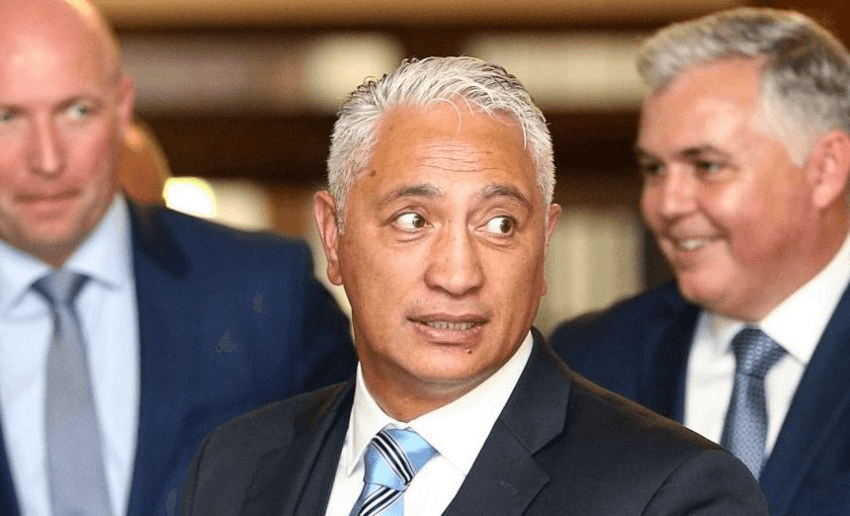The associate housing minister has apologised again for his threats to non-government service providers. But Boyd Swinburn says a muzzle is a contractual reality for NGOs receiving government money.
The hapless MP Alfred Ngaro has repeatedly apologised for “crossing the line” after his threats to withdraw funding for government sponsored organisations if they ever criticsed the government. The trouble is that poor old Alfred was not only verbalising how ministers think about funding non-government organisations (NGOs) but also what is actually written into their contracts. The line he crossed was, ironically, just talking about the way things work.
How about that for democracy? The logic inside ministers’ heads is “If we, the government, give you, the NGO, money then you should not turn around and criticise us or you will lose your funding.” But hang on a minute – whose money is it anyway and why should the government be beyond criticism?
It is not the politicians’ money, it is our money. We the taxpayers are the funders of government services. The democratic logic is “If we, the taxpayers, give you, the NGO, money to provide services where you have expertise, we fully expect you to advocate for improved programs and policies in those areas, because that will better serve us as taxpayers and citizens.”
You won’t hear that kind of talk around the Beehive corridors.
Since the late 1990s muzzle clauses started appearing in the contracts that NGOs held with government and now they are standard practice – so much so that Alfred Ngaro was simply translating the contract-speak into realpolitik-speak. An example from a current contract, shown below, all sounds very genteel, but given the enormous power difference between a criticism-sensitive government that holds the purse strings and an NGO which is running on a shoe-string budget, this is a muzzle clause with a capital M.
In the 1990s I was medical director of the Heart Foundation and heavily involved in advocating for action on the two biggest preventable causes of ill health – tobacco and obesity. Even though the Heart Foundation received significant government funding to deliver nutrition programs in schools and communities, there was never any sense that the government would cut the Heart Foundation’s programme funding if I criticised it for dragging its heels in areas such as tobacco tax, smokefree environments and restricting junk food marketing to children.
During my tenure we set up the Smokefree Coalition and Agencies for Nutrition Action (ANA) to create a broader advocacy voice. These were both coalitions of several NGOs who were pressing for stronger government action. Typically, NGOs are small organisations of committed individuals who are trying to achieve big societal goals with little money.
The Smokefree Coalition and ANA, like many others with social-good objectives, struggled to both have a significant public health voice and stay solvent. An attractive option, therefore, was to take on some government contracts which fitted their expertise, such as providing professional education, creating resource materials, undertaking policy analyses and so on. So for a few years, having government contracts worked as a way to keep the coalitions viable while still keeping their advocacy voices for prevention alive.
However by the late 90s the government started importing the US approach of muzzling NGOs. In the US by then, the term ‘advocacy’ had already become a dirty word. It could not be included in any documents related to government – research projects, programme objectives and funding proposals all had to remove any sense that the organisation receiving the funding would criticise the government.
So what has happened since these muzzle clauses have appeared? Well, as you might expect, the NGOs have been effectively silenced. The clauses have worked as intended. ANA had to transform itself into a health and community professional support organisation and to stop calling for stronger obesity prevention policies in order to survive. Both the professional support systems and the advocacy are definitely needed, but now doing the first precludes the second. The Smokefree Coalition tried to do both things but the government finally closed it down, and shut it up, a few years ago by not renewing its contracts.
Where are the voices for public health policy action for prevention now? Some NGOs, like ASH and the Cancer Society, have steered clear of government contracts and remain at liberty to be public advocates, but most NGOs have had to pull right back on advocacy. Universities retain the ‘conscience and critic’ role as part of their founding legislation, but in reality researchers are also highly prone to losing contract research funding if they start criticising the government.
I know that politicians do not like the pressure that annoying NGOs place on them to be more progressive in their public policies, but it is vital for a vibrant, robust democracy that their voices are not gagged.
New Zealand’s democracy is enormously strengthened by our arm’s length, taxpayer-funded system of ombudsmen and commissioners which keeps government, businesses and society honest, fair and transparent.
Imagine a similar taxpayer-funded system to support the voices of NGOs that are representing consumers, patients, citizens, taxpayers, children and people in need. Removing the muzzle clauses from contracts and removing the arrogance from ministers responsible for health and social service funding would be a good start to achieving a better and fairer democracy.
This content is brought to you by LifeDirect by Trade Me, where you’ll find all the top NZ insurers so you can compare deals and buy insurance then and there. You’ll also get 20% cashback when you take a life insurance policy out, so you can spend more time enjoying life and less time worrying about the things that can get in the way.
This election year, support The Spinoff Politics by using LifeDirect for your insurance. See lifedirect.co.nz/life-insurance

